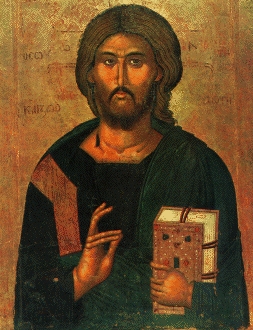
By Nicolai Gideon
I just happened to think a little about Easter, and I would like to just freely discourse over it...
Here, when the big 40 day's lent is over, and Easter Sunday appears, the priest greets the congregation with the exclamation "Christ is risen from the dead, trampling down Death by death, and upon those in the tomb bestowing life!" In other words - all the perishable which turns this, however beautiful, world into a place of suffering has been disarmed, because (as St Paul says) “Death has been swallowed up in victory. Where, O death, is your victory? Where, O death, is your sting?” (1 Cor. 15:54b-55). The world and the human life now can be seen and lived from another and bigger perspective than that of the natural perishable human being's. The human being is invited and called to participate in God's life of love, and thus see everything, which is, from this perspective. All this is made real and testified in the event that the greeting of the priest in the Eastern Church, Easter morning, points to and re-actualizes: "Christ is risen!"
And the congregation replies "Yes, surely - Christ is risen!" In this reply lies a deep secret, because as St Paul says elsewhere "no one can say “Jesus is Lord” except by the Holy Spirit" (1 Cor. 12:3), and "your body is a temple of the Holy Spirit within you, which you have from God" (1 Cor. 6:19). Therefore existence can be seen from another perspective, since there in the statement "Christ is risen" lies the confession, that Christ is "declared to be Son of God with power according to the spirit of holiness by resurrection from the dead" (Rom 1:4).
In other words - to answer "yes" to the greeting of the priest means to answer "yes" to the invitation, the calling, not just to see things from a new perspective, but more fundamentally not to limit oneself to one's own natural perishable human life, but to receive one's life directly out of the Eternal Triune God, who himself is love, precisely because there in the answer also lies the following confession, "it is no longer I who live, but it is Christ who lives in me. And the life I now live in the flesh I live by faith in the Son of God" (Gal. 2:20).
Consequently, seen from this perspective, no life-crisis (in new testament vocabulary called the day of judgement) is catastrophic any longer no matter how big it might be, because as St John the Theologian says: "God is love, and those who abide in love abide in God, and God abides in them. Love has been perfected among us in this: that we may have boldness on the day of judgment, because as he is, so are we in this world. There is no fear in love, but perfect love casts out fear; for fear has to do with punishment, and whoever fears has not reached perfection in love." (1 John 4:16b-18).
"... as he is, so are we in this world." This thought has later been fully matured in the orthodox tradition, and thus St Athanasius can say that "God became man (participated in human life) that humans might become divine (participate in the divine life)", and St Maximus the Confessor says "God and those who are worthy of God have one and the same energy". Energy here is to be understood as love, which always is active in actions - otherwise it would not be love.
In the exclamation of the priest and the answer of the congregation thus lies an immense fullnes of meaning which on the one hand fastens the positions - God remains God, and the human being remains human - while at the same time the two are tied immensly close in a bond of love, which goes beyond death, beyond all the perishable which turns this, however beautiful, world into a place of suffering.
So then with this I will pass on the priestly Easter greeting of the
East Church, and wish you all, in the protestant North-West, a very joyful
Easter.

|
Novi Sad, Saturday, March the 30th, 2002